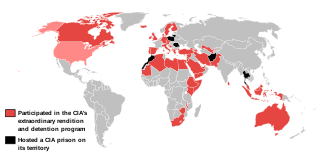
Abu Zubaydah is a Palestinian citizen born in Saudi Arabia currently held by the U.S. in the Guantanamo Bay detention camp in Cuba. He is held under the authority of Authorization for Use of Military Force Against Terrorists (AUMF).

Ahmed Khalfan Ghailani is a Tanzanian conspirator of the al-Qaeda terrorist organization convicted for his role in the bombing of embassies in Kenya and Tanzania. He was indicted in the United States as a participant in the 1998 U.S. embassy bombings. He was on the FBI Most Wanted Terrorists list from its inception in October 2001. In 2004, he was captured and detained by Pakistani forces in a joint operation with the United States, and was held until June 9, 2009, at Guantanamo Bay detention camp; one of 14 Guantanamo detainees who had previously been held at secret locations abroad. According to The Washington Post, Ghailani told military officers he is contrite and claimed to be an exploited victim of al-Qaeda operatives.

Mohamedou Ould Slahi is a Mauritanian engineer who was detained at Guantánamo Bay detention camp without charge from 2002 until his release on October 17, 2016.

Mustafa Ahmed Adam al-Hawsawi is a Saudi Arabian citizen. He is alleged to have acted as a key financial facilitator for the September 11 attacks in the United States.

Camp Delta is a permanent American detainment camp at Guantanamo Bay that replaced the temporary facilities of Camp X-Ray. Its first facilities were built between 27 February and mid-April 2002 by Navy Seabees, Marine Engineers, and workers from Halliburton subsidiary Kellogg, Brown and Root. It is composed of detention camps 1 through 6, Camp Platinum, Camp Iguana, the Guantanamo psychiatric ward, Camp Echo and Camp No. The prisoners, referred to as detainees, have uncertain rights due to their location not on American soil. There are allegations of torture and abuse of prisoners.

Binyam Ahmed Mohamed, also referred to as Benjamin Mohammed, Benyam Mohammed or Benyam Mohammed al-Habashi, is an Ethiopian national and United Kingdom resident, who was detained as a suspected enemy combatant by the US Government in Guantanamo Bay prison between 2004 and 2009 without charges. He was arrested in Pakistan and transported first to Morocco under the US's extraordinary rendition program, where he claimed to have been interrogated under torture.

Shaker Abd al-Rahim Muhammad Aamer is a Saudi citizen who was held by the United States in the Guantanamo Bay detention camp in Cuba for more than thirteen years without charge.
Extrajudicial prisoners of the United States, in the context of the early twenty-first century War on Terrorism, refers to foreign nationals the United States detains outside of the legal process required within United States legal jurisdiction. In this context, the U.S. government is maintaining torture centers, called black sites, operated by both known and secret intelligence agencies. Such black sites were later confirmed by reports from journalists, investigations, and from men who had been imprisoned and tortured there, and later released after being tortured until the CIA was comfortable they had done nothing wrong, and had nothing to hide.

Mohammed Farik Bin Amin, alias Zubair Zaid, is a Malaysian who is alleged to be a senior member of Jemaah Islamiyah and al Qaeda. He is currently in American custody in the Guantanamo Bay detention camp. He is one of the 14 detainees who had previously been held for years at CIA black sites. In the ODNI biographies of those 14, Amin is described as a direct subordinate of Hambali. Farik Amin is also a cousin of well-known Malaysian terrorist Zulkifli Abdhir.

The Guantanamo Bay detention camp, also known as GTMO or GITMO, is a United States military prison within Naval Station Guantanamo Bay (NSGB), on the coast of Guantánamo Bay, Cuba. It was established in January 2002 by U.S. President George W. Bush to hold terrorism suspects and "illegal enemy combatants" during the Global War on Terrorism following the attacks of September 11, 2001. As of August 2024, at least 780 persons from 48 countries have been detained at the camp since its creation, of whom 740 had been transferred elsewhere, 9 died in custody, and 30 remain; only 16 detainees have ever been charged by the U.S. with criminal offenses.
Ahmed Mohammed Ahmed Haza al-Darbi is a citizen of Saudi Arabia who was held in the United States Guantanamo Bay detainment camps, in Cuba from August 2002 to May 2018; in May 2018, he was transferred to Saudi Arabia's custody. He was the only detainee held at Guantanamo released during President Donald Trump's administration.

Sharqawi Abdu Ali al-Hajj, also known as Riyadh the Facilitator, is a Yemeni alleged Al-Qaeda associate who is currently being held in the United States' Guantanamo Bay detention camps, in Cuba. He is accused of being a "senior al-Qaida facilitator who swore an oath of allegiance to and personally recruited bodyguards for Osama Bin Laden".
"Enhanced interrogation techniques" or "enhanced interrogation" was a program of systematic torture of detainees by the Central Intelligence Agency (CIA), the Defense Intelligence Agency (DIA) and various components of the U.S. Armed Forces at remote sites around the world—including Abu Ghraib, Bagram, Bucharest, and Guantanamo Bay—authorized by officials of the George W. Bush administration. Methods used included beating, binding in contorted stress positions, hooding, subjection to deafening noise, sleep disruption, sleep deprivation to the point of hallucination, deprivation of food, drink, and medical care for wounds, as well as waterboarding, walling, sexual humiliation, rape, sexual assault, subjection to extreme heat or extreme cold, and confinement in small coffin-like boxes. A Guantanamo inmate's drawings of some of these tortures, to which he himself was subjected, were published in The New York Times. Some of these techniques fall under the category known as "white room torture". Several detainees endured medically unnecessary "rectal rehydration", "rectal fluid resuscitation", and "rectal feeding". In addition to brutalizing detainees, there were threats to their families such as threats to harm children, and threats to sexually abuse or to cut the throat of detainees' mothers.
Music can be used as a tool of psychological warfare. The term "music torture" is sometimes used to describe the practice. While it is acknowledged by United States interrogation experts to cause discomfort, it has also been characterized as having no "long-term effects".
Camp No is an alleged secret detention and torture facility related to the United States detainment camps located in Guantánamo Bay, Cuba. On January 18, 2010, Scott Horton asserted in an article in Harper's Magazine, the result of a joint investigation with NBC News, that such a facility was maintained outside the regular boundaries of the Guantanamo Bay detention camps.
Guantanamo Bay homicide accusations were made regarding the deaths of three prisoners on June 10, 2006, at the United States Guantanamo Bay detention camp for enemy combatants at its naval base in Cuba. Two of the men had been cleared by the military for release. The United States Department of Defense (DOD) claimed their deaths at the time as suicides, although their families and the Saudi government argued against the findings, and numerous journalists have raised questions then and since. The DOD undertook an investigation by the Naval Criminal Investigative Service, published in redacted form in 2008.
In 2003, a secret compound, known as Strawberry Fields, was constructed near the main Guantanamo Bay detention camps, in Cuba. In August 2010 reporters found that it had been constructed to hold CIA detainees classified as "high value". These were among the many men known as ghost detainees, as they were ultimately held for years for interrogation by the CIA in its secret prisons known as black sites at various places in Europe, the Mideast, and Asia, including Afghanistan.
Richard Patrick Zuley is a former homicide detective in the United States who had a 37-year career in the Chicago Police Department. He is most known for obtaining confessions from suspects by torture. Since the early 2000s, some of these convictions have been investigated and overturned as wrongful, following allegations that he had tortured and/or framed suspects. Since 2013 he has been the subject of several civil suits from inmates claiming abuse and frame-ups to gain convictions.

Mansur Ahmad Saad al-Dayfi is a Yemeni who was held without charge in the United States Guantanamo Bay detention camps in Cuba from February 9, 2002, to July 11, 2016. On July 11, 2016, he and a Tajikistani captive were transferred to Serbia. His Guantanamo Internment Serial Number was 441.

Following the September 11 attacks of 2001 and subsequent War on Terror, the United States Central Intelligence Agency (CIA) established a "Detention and Interrogation Program" that included a network of clandestine extrajudicial detention centers, officially known as "black sites", to detain, interrogate, and often torture suspected enemy combatants, usually with the acquiescence, if not direct collaboration, of the host government.










